- Home
- L. R. Patton
The Perilous Crossing Page 4
The Perilous Crossing Read online
Page 4
“What do you mean, you could do something?” Arthur says. He looks at Maude. She shakes her head, as if it say, It is too dangerous to risk the life of a child. Though she does not know the plan, she assumes that it is a dangerous one, for the king’s men have found their traps, and they have found the portal, so it seems. What plan would not be dangerous?
“I still have a bit of magic left,” Mercy says.
“But you could not draw water from the ground,” says Ursula, a girl with raven hair.
“I could,” Mercy says. “I did not.”
“You hid this from us?” says a boy named Chester. His soil-brown eyes narrow. “You would have us die?”
“I would have you live,” Mercy says. “Please. Hear me.”
The room falls quiet. Arthur is the first to speak. “Very well,” he says. “You have a plan.”
“I still have magic,” she says. “I have saved my magic for this plan.”
“What plan?” Arthur says.
“The plan that will save us,” Mercy says.
The children look at one another. Hazel looks at her friend. She cannot ignore the fear that settles in her chest.
“Let us hear your plan,” Arthur says. He is hopeful, you see. Mercy was his most promising student, before they became trapped underground and the food and water began to disappear. She could do magic Arthur had not seen in years. He had once, very recently, considered approaching her mother for permission to do advanced magic lessons, the first of his pupils to reach such a level.
“I could disappear,” Mercy says. She breathes, a soft exhale, as if she is trying to convince herself that this is not so very dangerous after all. “I could reappear.”
The children stare at her, their mouths open. No one has touched their bread. Is it hope that draws their mouths open in this way? Or is it fear for their friend?
This is, you see, quite a dangerous spell. When one vanishes into thin air, one never knows whether one will reappear. If one does reappear, one does not know what sort of skin one will wear. Will one be old and bent? Will one be young and vibrant? Will one be human at all?
“I cannot allow it,” Arthur says. “It is far too dangerous.”
Mercy stands up. She is not typically a child who defies her elders, but she is the best hope they have. She knows this. She will not let their hope pass by without a try.
“There is nothing else we can do,” Mercy says.
Arthur and Maude stare at her.
“There is nothing else,” she says again. “We will all die.” She looks around at the children.
“It is too dangerous,” Hazel says. “You cannot. We could all die anyway.”
“I am willing to risk my life,” Mercy says. She looks as though she is about to cry. Where is their faith in her magic? Where is their permission? Where is their hope? Is it really so very easy to let go of hope?
“There is nothing else,” Maude says, and now the children turn to her. Arthur’s shoulders slump, for he knows, too, that this is so.
Mercy smiles the smallest smile a person could ever see, just a slight bit of hope gathered in the corners. Maude, you see, is not so easy an ally. “I will disappear,” Mercy says. “I will reappear. I will restore the portal with something I carry, something I wear, whatever I may find. And you will all run.”
“And you will run,” Hazel says, for her friend has not told them all the other part of her plan.
Mercy shakes her head. “No,” she says. “I will return to the village to look for Theo. And when I find him, we will come to you. We will find you.”
The room grows very quiet. There are so many eyes on her face that Mercy’s heats up to a red sort of color, splotchy and uneven.
“You must come with us,” Arthur says. “Or we cannot allow it.”
“Our only hope is finding Theo,” Mercy says. “Finding Theo and bringing him to Hazel. Letting their magic strengthen one another. It is the only way we will escape.”
“Perhaps it is not best to escape,” Arthur says.
Maude gasps. “Arthur,” she says. “What is this?”
“Perhaps it is better to give ourselves up? To fall on the mercy of the king?” Arthur says. His words come out like a question.
“Never,” Maude says. “The king has no mercy.”
The children look at each other. It is true. There is no mercy in a single bone of the king’s body, as far as they know. Not anymore. If there were, the children who do not possess the gift of magic would, today, be safe.
“It is the only way,” Mercy says. “This plan.”
“But what if it does not work?” Ursula says.
“Then we will at least have tried,” Mercy says.
“I cannot,” Arthur says, and the tears streak down his face. He pulls Mercy into a tight embrace that dislodges all the emotion she has held in her throat all morning. She, too, has loved this man, this father who is not really her father. He has always protected her, taught her, counseled her in what to do, and now it is she who must save him. Perhaps she will die. But is it not a noble sacrifice to try?
And when they are done with their tearful goodbye, Arthur says, “Very well,” and then, again, “very well. You must go.” His lips pull tight in a grimace. It is not so very easy to allow a child you love to walk into Death’s jaws, though there is a chance that Mercy could survive.
Mercy turns to her best friend. “What if you do not reappear?” Hazel says. “What if we are trapped down here anyway? What will it have accomplished?”
“I will have done my part,” Mercy says.
“But you could do your part pulling water from the ground,” Hazel says. Her eyes are red and shining.
“And we would still be trapped,” Mercy says. “We would still be starving.”
Hazel dips her head, then brings it back up to look at her friend. “How will I know you?”
“I will find you,” Mercy says. “Do not worry.”
But of course, one will worry when one loves a friend as Hazel loves Mercy.
Mercy hugs the rest of the children and then kisses the cheek of Maude and, once more, hugs Hazel.
“Take care, my friend,” Hazel says. “And hasten back.”
“I will,” Mercy says. She pulls away and looks into Hazel’s eyes. “And I will bring with me your brother.”
And then, in a single breath, Mercy disappears, and the house beneath the ground grows silent.
KING Willis is pacing the throne room, though it is not so much pacing as it is waddling, for you will remember that our king has grown large and cumbersome in his years on the throne. This is the result of eating too many sweet rolls and, perhaps seconds or, rather, thirds and fourths and fifths at every meal he is served. But still, he waddles, and while he waddles he thinks, and while he thinks he talks about what he will do with the missing children when they are, at last, found and returned to the castle.
He will beat them, no, he will let them starve in the dungeons beneath the dungeons, no he will feed them to the creatures of the forest, no, he will tie them up and—
Queen Clarion bursts into the throne room, and though the distance between the door and his throne is wide and vast, it is her voice that disturbs him from his thinking.
“Willis!” she cries. “Willis, you must come at once!”
But the king, self-absorbed man he is, does not notice the terror and panic clutching his wife’s words. So she must run the entire length along the blood-red carpet to the foot of the throne. He does not seem to notice her until she says, “It is Virgil.”
“What?” he says. “What is it you say, woman?” King Willis, you see, is not so very polite to this woman he claimed to love once.
Queen Clarion bristles at his contempt, but she does not waste words on a matter that must wait for later, for there is a more pressing matter that must be seen to.
“Our son!” she says. “He has disappeared!” The news, even now, even while she has had whole minutes to digest it, is so shocking
, it steals her very breath.
The golden chalice in King Willis’s hand drops to the floor in a clanging crash. Grant, the king’s page, rushes to clean up the mess of red wine that pools into a stain at the foot of the king.
“What is this?” King Willis says. “What is this you say?”
So the queen repeats this disturbing bit of news. She noticed Prince Virgil missing in the morning, when she knocked on his chambers to see if he would like breakfast. She did not think anything amiss. Her son, after all, sometimes disappears in the early morning hours, for he enjoys walking the grounds, and, before the children disappeared, he often made his way into the village at first light. But she has not found him in the village, nor has she found him on the castle grounds or in the gardens. She realizes now that she did not think to look near the bridge, for her son was terrified of the Violet Sea, even if the bridge crossed only a small freshwater tributary and not the open sea.
When King Willis makes no move and does not speak, Queen Clarion says, “Our son. He is gone.”
“Gone?” King Willis says, as though he still does not quite understand. “What do you mean, our son is gone?”
“Disappeared,” she says. “He has vanished.” Her voice rises a bit, tight and panicked. King Willis shakes his head, as if shaking off a fog.
“Then find him,” he says.
“I have been searching,” she says. “I have searched all morning. I do not know where he could be. Perhaps someone...” But you see, dear reader, she cannot say the words. She cannot even think the words.
Perhaps someone has taken him.
“Look harder,” King Willis says, as if he has forgotten that this woman who stands before him is a queen, not a servant. “He must be here somewhere. Search the entire village.”
“But I cannot do it alone,” Queen Clarion says. She wrings her hands. “I need help.” The last word breaks in her mouth, for Queen Clarion is terribly afraid. Afraid that, perhaps, her son entered the woods without a single soul knowing, and now he has disappeared to that land where boys never grow old. Afraid that one of the villagers has taken him so that they may bargain with the king to have their children returned to them. Afraid that he has run away. Afraid that he is in danger. Afraid that she, his mother, will never see him again.
“Well, then, get help,” King Willis says.
“All the men of the guard,” Queen Clarion says, “are in the woods.”
“As they should be,” King Willis says.
He is distracted today, you see. It is not entirely his callous heart that answers so flippantly, so unaffectedly, so harshly. His son has disappeared, and he is not thinking clearly, and the children must be found, and now his son must be found, and what is a king to do?
Queen Clarion takes a deep breath. “We must call them home,” she says. “For our son.”
“Call them home,” King Willis says. “But what about the missing children?”
“Our son has become a missing child,” Queen Clarion says. Her voice, this time, wears stone. “Call the king’s guard home.”
King Willis and Queen Clarion stare at one another for a time. And then King Willis says, “Very well, then. I shall call them home.”
What is it, dear reader, that induces our king to change his mind? Perhaps he has seen something in Queen Clarion’s eyes. Perhaps he has felt the full loss of a son in these few breaths between Queen Clarion’s words and his own. Perhaps there is another reason entirely. It is quite impossible to know.
Queen Clarion follows Garth out to the front steps of the castle and stands on the marble slab that leads to the first of them. Garth looks toward the village, then shifts ever so slightly toward the distant line of forest trees that lie west of the castle and blows a bugle loud enough for all the kingdom to hear.
THE people of the village look out their windows. The call comes loud and clear and long, piercing the gray sky like a gold sword ripping the clouds in two, dividing their hearts in two. Hope. Danger. Which shall it be? They have never heard a sound such as this one, though they have heard of its significance, in the stories told of King Sebastien and his war with their ancestors. Is it a war cry? Is it a call for the people to assemble? Is it a warning of danger? They cannot remember.
Cora, in her home, looks toward the castle, its great gray towers touching the sky, it seems.
“Something has happened,” she says, though there is no one in her home to hear it. “Something has happened.” And she flies out her door.
She is not the only one. There are others moving from their homes, racing down the road, kicking up red-brown dust, a sight that has not been seen since The Good King Brendon’s days on Fairendale’s throne, when he opened up the castle grounds for a Year’s Last Day feast, in which royal people mingled with common people. The people had loved him for his love, but a king’s rule, alas, cannot last forever.
The people fly toward the castle, on their way to see if there are children, long lost, beloved children who will be released.
Or, perhaps, worse.
SIR Greyson, too, hears the call that is intended for him. He knows precisely what it means. He must bring his men back to the castle. But, you see, he does not want to neglect his duties in the woods, either, for he knows that a man like King Willis is not a man always given to reason. King Willis is a man who might one moment call his captain home and, another, flay him for leaving the woods unguarded. And so it is that he divides his men in two, some who will stay, some who will go, and he takes more of the men with him, for he knows the nature of the call. One blow for an announcement of the kingly kind. Two blows for danger. Three blows for dragons of the unfriendly sort.
Sir Greyson waits for a third blow, but there is none. Two blows. Danger.
It is impossible for him to know what sort of danger, for Fairendale could not be under attack, could it? They have peaceful relations with most of the kingdoms. Had King Willis upset that fine balance in his letters?
The captain looks at the gray sky. It is vague, like the call. He has never liked vague.
Perhaps it is merely a simpler kind of danger. Perhaps it is no danger at all, merely a kingly announcement. After all, it has been years upon years since they have used the bugle call. Perhaps the bugler forgot what the calls mean.
He entrusts the woods, this place where a tiny shoe has been found, where his men search, once again, for the missing children, to his second-in-command, Sir Merrick.
“Watch these woods well,” Sir Greyson says to Sir Merrick, before taking to his horse and embarking on another flight. He and a bit more than half his men vibrate through the woods, leaving one danger behind and moving, perhaps, toward another.
Journey
IT was a bright, sunny afternoon with not a cloud marring the sky, a typical sky of this most beautiful of all kingdoms, when Greyson’s father came to him and said, “I must leave on the morrow, at first light.”
“But where, Father?” Greyson said, for his father had only just returned from another trip, and it was unusual for him to travel so much this time of year. They were coming up on the Year’s Last Day and the new Year’s First Day, and though nothing much kind could be said of King Willis, he did always let his men spend those days with their family.
“The king asks that I take some men with me to Ashvale,” his father said.
“But for what?” Greyson said. He was a strapping boy of sixteen now, his face mostly smooth lines and patchy stubble. His father put an arm around him, though Greyson stood almost as tall as he did.
“It is a routine peace-keeping trip,” his father said, which Greyson knew to be code for “Someone is angry again and I have to fix it.” One could not speak so freely in the streets of Fairendale, for there were always ears listening, and one did not know if they were the right ears. The king was said to have a spy, though no one had ever seen him. “Nothing to concern yourself about. I will return before you know it.” His father cleared his throat. “We will have dinner early toni
ght. And then I must rest before the departure.” He looked at his son, his eyes flashing with laughter. “Try not to be late.”
Greyson, you see, for all the good that was in him, had most always been late for supper. Usually he was about in the streets, talking with the children or with the men, sometimes visiting the widows. Sometimes watching the girls and their magic.
Sometimes watching one girl.
“Yes, sir,” Greyson said.
His father ambled away, and there she was, before him. She did not speak, was merely passing in the street, but he could not see anything else but her.
She was the most skilled of all the girls in the village, said to have a great gift of magic that made her fit for a king. Greyson was not king, but she was beautiful, and his eye was caught.
As far as he could see there was only one problem. She was older than he. No, that was not the problem, of course. The problem was that it was known about the village that she despised men, for she had once been promised to Prince Willis, before he was king, but the arrangement fell through when his brother was banished and there was another girl with stronger magic already living within the castle walls. The girl did not even speak to men any longer. Whatever Greyson tried to do to catch her eye, she would not be moved. But still he tried, and now she was nearing the age when it was said a woman would never marry.
He watched her from the street. Her flaming hair shook about her shoulders. It was long and straight, swinging into her face until she flung it back out. Her grassy eyes met his for a moment, or half of one, and then looked away, as if she did not, in fact, see him standing there at all.
She touched her staff to the ground, and the flower before her dried up.
“Why must you do that?” Greyson said. “Why must you steal its beauty?”
She did not speak to him, as if she had not heard.
She moved toward the water fountain. He followed her. And when she turned, when she hoisted herself up to the lip of the stone, she finally spoke. “You are like a shadow,” she said.

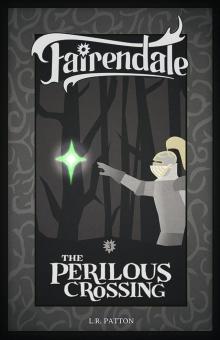 The Perilous Crossing
The Perilous Crossing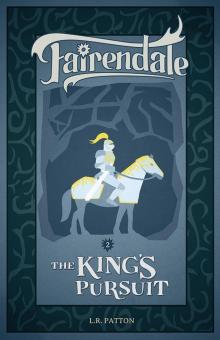 The King's Pursuit
The King's Pursuit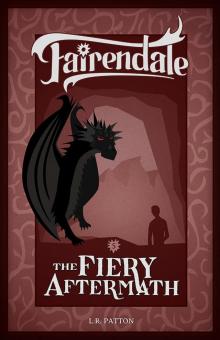 The Fiery Aftermath
The Fiery Aftermath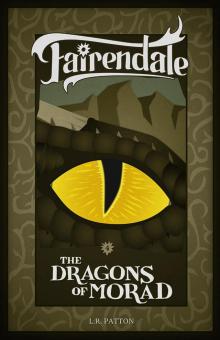 The Dragons of Morad
The Dragons of Morad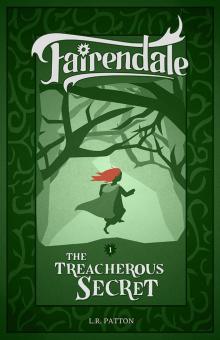 The Treacherous Secret
The Treacherous Secret